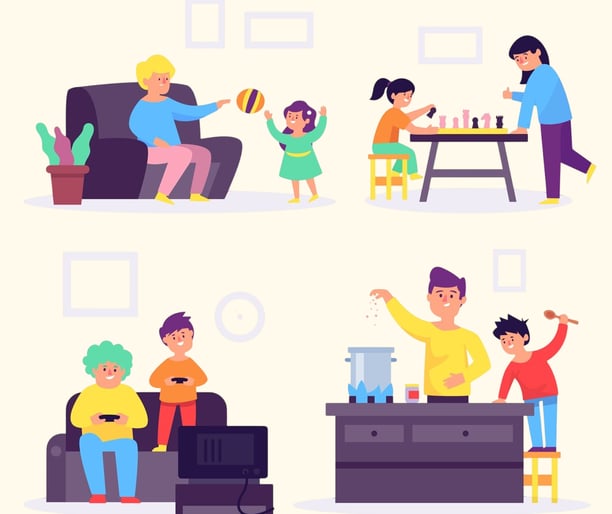Engage the Mind
Blog post description.
MENTAL AND EMOTIONAL RESILIENCE
12/15/20243 min read
Engage the Mind
Play simple games, read, or share stories to reduce stress and boredom. In survival situations or times of crisis, stress and boredom can weigh heavily on mental health.
Keeping your mind engaged and maintaining a sense of normalcy through simple games, reading, or storytelling can be powerful tools to boost morale, reduce anxiety, and promote group cohesion. These activities provide much-needed distraction and foster emotional resilience, helping you and those around you stay calm and focused.


1. Why It’s Important to Manage Stress and Boredom
Reduces Anxiety:
Engaging in recreational activities helps lower stress hormones (like cortisol) and promotes relaxation.
Prevents Mental Fatigue:
Continuous worry or hypervigilance can drain mental energy. Taking breaks for fun activities helps refresh the mind.
Fosters Group Cohesion:
Sharing games or stories brings people together, creating a sense of community and mutual support.
Provides a Sense of Normalcy:
Even in chaos, recreational activities offer a reminder of regular life, helping to stabilize emotions.
Distraction from Fear:
Keeping your mind engaged can help avoid rumination (dwelling on worries) and maintain emotional control.
Boosts Mental Health:
Activities like games, reading, or storytelling release endorphins (feel-good hormones) that improve mood.
2. Activities to Reduce Stress and Boredom
A. Play Simple Games
Why It Works:
Games engage the mind, promote laughter, and foster positive interactions. They can be especially useful in group settings.
Examples of Simple Games:
Card Games:
Examples: Go Fish, Rummy, or Solitaire. A deck of cards is lightweight and versatile.
Word Games:
Examples: 20 Questions, “I Spy,” or Word Association. No supplies are needed.
Board Games (Portable):
Examples: Chess, Checkers, or travel-size versions of classic games.
Hand Games:
Examples: Rock-Paper-Scissors or Thumb Wars. Simple and fun for all ages.
B. Reading
Why It Works:
Reading provides an escape from reality, exercises the mind, and can be both educational and relaxing.
Suggestions:
Books: If you have access to books, choose ones that are uplifting, inspirational, or educational.
Manuals and Guides: Reading survival manuals or how-to guides not only educates but also provides a sense of purpose.
Storytelling: If books are unavailable, take turns telling personal stories, legends, or folk tales to keep minds engaged.
C. Share Stories
Why It Works:
Storytelling strengthens social bonds, preserves culture, and boosts morale by sharing experiences and lessons.
Types of Stories to Share:
Personal Experiences: Stories from your past that are funny, challenging, or memorable.
Fables or Folktales: Traditional stories with moral lessons.
Survival Stories: Accounts of people who overcame adversity to inspire hope.
Imaginary Stories: Creative stories that allow for imagination and humour to flourish.
D. Other Simple Activities
Drawing or Sketching: Artistic expression can be calming and therapeutic.
Journaling: Writing down thoughts, feelings, or daily events can help process emotions.
Puzzles or Brain Teasers: Riddles, crosswords, or logic puzzles stimulate the mind.
Singing or Music: If possible, sing songs or create music with simple instruments to lift spirits.
3. Practical Tips for Incorporating These Activities
Pack Lightweight Items:
Include a deck of cards, a small book, or paper and pencils in your survival kit.
Use Found Objects:
Improvise games with natural materials (e.g., rocks, sticks) for activities like tic-tac-toe.
Take Scheduled Breaks:
Set aside regular times for relaxation and play to maintain a routine.
Rotate Activities:
Alternate between games, reading, and storytelling to keep things fresh and engaging.
Include Everyone:
Ensure that all group members, including children and elders, are involved in building community bonds.
Simple games, reading, and storytelling are powerful ways to relieve stress and alleviate boredom during difficult times.
These activities promote mental well-being, group unity, and a sense of normalcy in chaotic situations.
Engaging in recreational tasks boosts morale and fosters resilience, keeping hope and optimism alive.
In survival situations, keeping the mind active and spirits high can be just as important as having food and shelter.






